- Orthopedists in Moscow. consultation and treatment.
- Advice from an orthopedist. Prevention of flat feet in women.
- facilities
- Center for Rehabilitation and Sports Medicine (State Autonomous Institute for Medical Rehabilitation and Sports Medicine MRVSM Center).

- Center for Rehabilitation and Sports Medicine (State Autonomous Institute for Medical Rehabilitation and Sports Medicine MRVSM Center)
- THE MEDICAL DEPARTMENTS OF THE CENTER
- station 1
- Station #2
- Station #3
- List of Services
- Registration
- Services
- Paid services
- doctors
- chief doctor
- What if I'm not in the unit register either?
- Can a doctor write a prescription for a drug without having a policy?
- doctors
- Contact details
- Department menu
- If you have any questions or your right to free medical care has been violated, please contact
- In matters related to free medical care and in cases of violation of citizens' rights to medical care, conflict resolution, including in cases of refusal or confiscation of money for medical care, please contact the
- What you need to know about insurance agents from health insurance organizations
- Insurance agent:
- In addition, you can contact your insurance agent at the insurance company's facility if you
- How do I get to the consultation?
- When should you see a doctor?
- How to make an appointment
- The main state hospitals
- Municipal Clinical Hospital No. 1
- Clinical Research Center Moscow
- MEDICAL-SURGICAL CENTER MICPC
- Top private clinics
- EMC
- Medical center MedSwiss
- Survive the surgery
- dismissal
Center for Rehabilitation and Sports Medicine (State Autonomous Institute for Medical Rehabilitation and Sports Medicine MRVSM Center)
Official nameMoscow City State Autonomous Health Institution 'Moscow Center for Medical Rehabilitation, Rehabilitation and Sports Medicine MRVSM'.
The Moscow Sports Medicine Center was founded in 1999 on the Usachevs-Naidenov site, where in Soviet times the high-mountain sanatorium was located, followed by a sports medicine clinic. For more than 60 years, the sports medicine center has been helping athletes whose lives are shaped by injuries, illnesses and stress. The sports medicine center has developed methods for the treatment of specific pathologies in sports over the years. The Sports Medicine Center has, over the years, developed methods to treat specific pathologies in sports. The center's doctors also carry out scientific work that contributes to the development of new approaches to treatment, rehabilitation and prevention.
The structure of the sports medicine clinic 'MNPC MRVSM' includes the following units: organization and methodology department, polyclinic, 2 departments for rehabilitation treatments, clinical diagnostic laboratories and clinical-biochemical laboratories, departments for radiology, rehabilitation, surgery, physiotherapy, dentistry, therapy, functional diagnostics, sports medicine , traumatology, sports injury center and sports pharmacy.
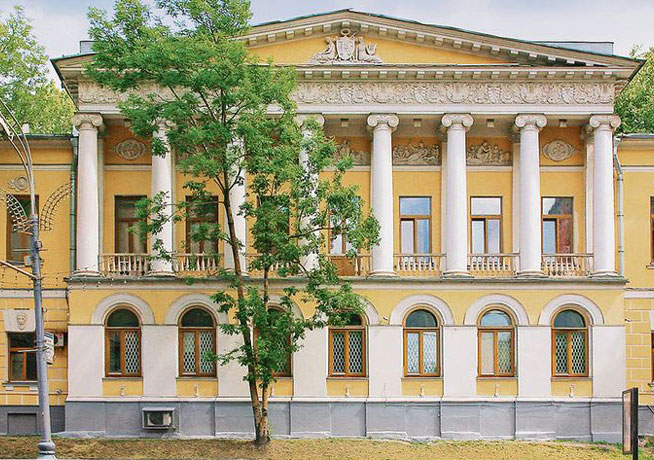
- Address: 105120, Moscow, Zemlyanoy val, bld. 53
- Medical rehabilitation: +7 977 160 04 25
- Sports medicine: +7 915 178 08 01
- Traumatology and Orthopedics +7 495 917 11 49
THE MEDICAL DEPARTMENTS OF THE CENTER
station 1
- Medical registration
- Hospitalization Department
- Trauma ward with operating room (25 beds)
- Anesthesia and resuscitation ward
- Therapeutic rehabilitation ward for patients with dysfunctions of the peripheral nervous system and the musculoskeletal system
(65 beds) - Day clinic (10 beds)
- Physiotherapy and exercise therapy
- Therapeutic Fitness and Sports Biomechanics Laboratory
- Department of Radiology
- Department of Radiology
- Functional Diagnostics Department
- Counseling and Diagnostics Department
- Neurophysiology Laboratory
Station #2
- Department of Outpatient Therapeutic Rehabilitation
- Department of remedial gymnastics and sports medicine
- Diagnostic department
- Department of Electrotherapy
- Hydrotherapy Department
- Department of Inpatient Admissions
- Inpatient rehabilitation department (80 beds)
- Day clinic (15 beds)
Station #3
- admission station
- Medical rehabilitation ward for patients with disorders of the central nervous system ¹1 (90 beds)
- Medical rehabilitation ward for patients with disorders of the central nervous system ¹2 (90 beds)
- Medical rehabilitation ward for patients with disorders of the central nervous system 3 (65 beds)
- Medical rehabilitation ward for patients with disorders of the central nervous system No. 4 (65 beds)
- Medical rehabilitation for patients with diseases and injuries of the musculoskeletal system
No. 5 (60 beds) Medical rehabilitation ward for patients with diseases and consequences of injuries to the musculoskeletal system and peripheral nervous system - Medical rehabilitation ward No. 6 (60 beds) for patients with injuries to the musculoskeletal system and peripheral nervous system
- Medical rehabilitation ward for patients with diseases and consequences of injuries of the musculoskeletal system and peripheral nervous system No. 7 (60 beds)
- Medical rehabilitation ward for patients with diseases and consequences of injuries of the musculoskeletal system and peripheral nervous system No. 8 (60 beds)
- Diagnostic department
- Department of Physiotherapy
- Department of gymnastics and therapeutic massage
- Operational Department
List of Services
The orthopedist can provide a number of services within the framework of statutory health insurance
- Initial examination and diagnosis.
- Treatment of various types of injuries (e.g. sprains) and their consequences.
- Treatment of complications of musculoskeletal injuries (e.g. delayed healing of fractures).
- Diagnosing, preventing and correcting problems.
- Individual therapy with therapeutic exercises.
- Comprehensive therapy for the treatment of various diseases of the musculoskeletal system.
If a person needs any of the above treatments, they should consult their doctor or podiatrist.
Registration
An appointment with an orthopedist should be made after your GP has issued a referral for free treatment. This can be done in different ways:
- By phone when registering at the health center.
- Via the terminals installed in the polyclinics (if available).
- Via the online registration system.
It is most convenient for patients to make an appointment with an orthopedist or other specialist through the online registration system. When registering on the website, you must log in, enter your MHI insurance number and enter your date of birth.
After logging in, the website will show the days and times for which you can make a doctor's appointment. The information is given only for the polyclinic to which the patient is assigned. If he or she wants to receive medical services in another facility, this must be officially changed.

An appointment with a specialist can usually be made one to two weeks in advance. If a person's plans change, they can always change their appointment the same way.
Services
Qualified doctors work at the Botkin Polyclinic, most of whom have not only specialist training and university degrees, but also extensive practical experience. It offers the widest possible range of medical services, including:
- diagnostic activities
- Outpatient and polyclinic medical care;
- laboratory tests;
- inpatient treatment, etc.
Botkin Children's Hospital (Moscow) is a truly multi-structured organism, consisting of a large number of wards, rooms, departments, areas, etc. A large number of diseases of all types and complexity can be treated here completely free of charge.
Paid services
The Botkin Medical Center offers paid services, which are also offered in a wide range:
- Consultations and special examinations;
- functional diagnostics;
- ultrasound examinations;
- radiography;
- Computed Tomography;
- magnetic resonance imaging;
- medical psychology;
- therapeutic exercises;
- laboratory diagnostics;
- physiotherapy, etc.
Note: You can read the price list of paid services at DZM Botkin by clicking this link. If you click on the link, you will be redirected to the official website of the clinic and asked to download the price list document.
doctors
As previously mentioned, Botkin Hospital today has an exceptionally high caliber and extremely professional team. In 2021, the clinic will employ around 1,000 experienced doctors from various disciplines and 2,000 nursing staff. The team includes at least 24 specialists with the title 'Best Doctor in Moscow'. Botkin Hospital is a medical center where you can get expert help from specialists:
- endocrinologists;
- physiotherapists
- allergists
- immunologists;
- general practitioner;
- pediatrician
- hematologists;
- ophthalmologists;
- master of clinical diagnostics;
- anesthesiologists and intensive care physicians, etc.
From the very beginning of its existence, the Botkin State Clinical Hospital was distinguished by an extremely strict and rigorous personnel policy. From the very beginning, the clinic employed only specialists from various medical fields.
chief doctor
The Chief Physician of Botkin State Clinical Hospital was the head of Botkin State Clinical Hospital. Botkina, MD, Professor and Corresponding Member of the Russian Academy of Sciences - Alexei Shabunin. The chief physician of the Botkin Polyclinic has not only a large number of professional awards, but also a wide range of practical experience. He is a highly qualified medical specialist who has been awarded numerous orders and medals and his main specialty is surgery.
He has been a medical doctor since 1984 and holds a number of medical qualifications. The portfolio of the specialist includes a large number of internships, which he completed in Munich, Boston, Rome, Tokyo and Seoul, among others. The deputy chief physician, Evgeny Nikitin, also has a large number of orders.
What if I'm not in the unit register either?
Even if you have not only forgotten or lost your policy and even if you are not entered in the uniform CMI register, you are not in a fix. In this case, the outpatient clinic and specialist medical care are financed from the provincial budgets. Furthermore, denying newborns medical care before they have an MHI policy is unacceptable: such young patients are treated under the mother's or other legal representative's policy.
The minimum scope of care is described in the MHI basic program. Each region decides what to add to this list.
What can and cannot be done with the policy:
You can check the exact list at any health center or on the website of your region's Ministry of Health.
It's easy to apply the following rule to your insurance policy: if you have a life or health risk, you can get it for free. If you're not feeling too bad in general, but would like to feel even better, you can pay for it out of pocket.
Can a doctor write a prescription for a drug without having a policy?
The doctor has the right to issue a prescription for anyone who needs it, both in the MHI system and in the case of paid medical services.
Imagine the situation: you have a cast on your leg, you need an X-ray, and this is on the third floor and the elevator doesn't seem to be working. And you crawl up the sick stairs like a superhero martyr. That's not the right way to go. The doctor must decide how to transport the patient, taking into account the severity of the disease and possible complications in the course of the disease, and the administration must organize safe transport.
To do this, ask the health center staff to take you to the examination. In the event of a refusal, you have the option of writing a complaint to management, contacting the health insurance company or reporting to the provincial health department and the public prosecutor's office.
doctors
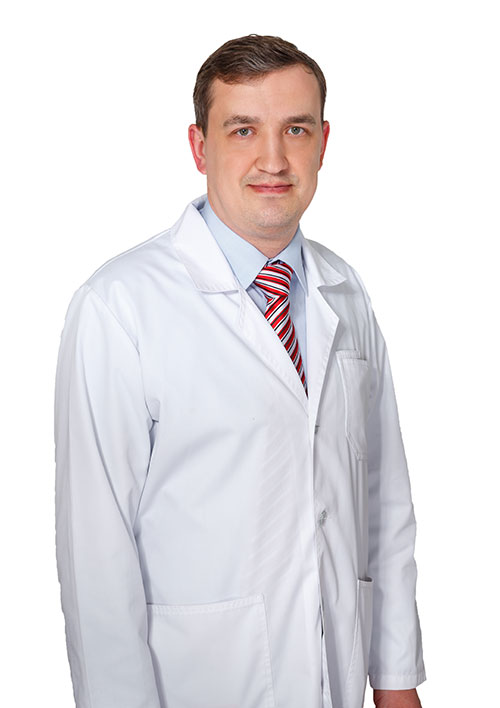
Lantsov Vladimir Vladimirovich
Head of the department – orthopedic traumatologist.
- Education: Medical school, graduated from Russian State Medical University in 2003.
- Certificate in Traumatology and Orthopedics.
- Qualification category: highest.
- Member of the Russian Osteopathic Association
Kozlov, Alexander Sergeevich
traumatologist and orthopaedist
- Education: Diploma in medicine, graduated from the 2nd Moscow State Medical University NI Pirogov in 1993.
- Diploma in Paediatrics, Qualification: Doctor.
- Certificate in Traumatology and Orthopedics
- Certificate for the specialty 'Surgery (paediatrics)
- Qualification category: higher
- Candidate of Medical Science
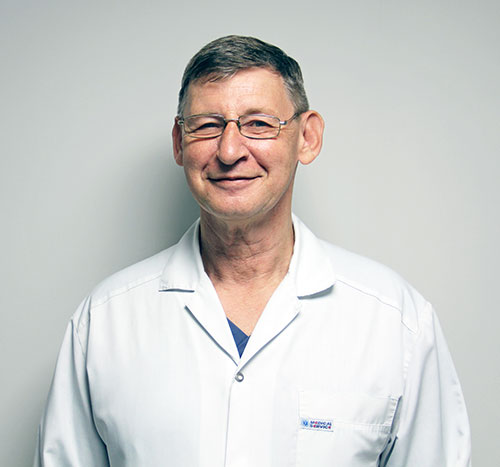
Makhrov Lev Alexandrovich
traumatologist and orthopaedist
- Education: Medical diploma, graduated from the 2nd Moscow State Medical University NI Pirogov in 1982.
- Postgraduate studies in pediatrics, degree: Doctor.
- Certificate for the specialty 'Traumatology and Orthopaedics'.
- Certificate for the specialty 'Surgery (paediatrics)'.
- Qualification category: higher
- Candidate of Medical Sciences
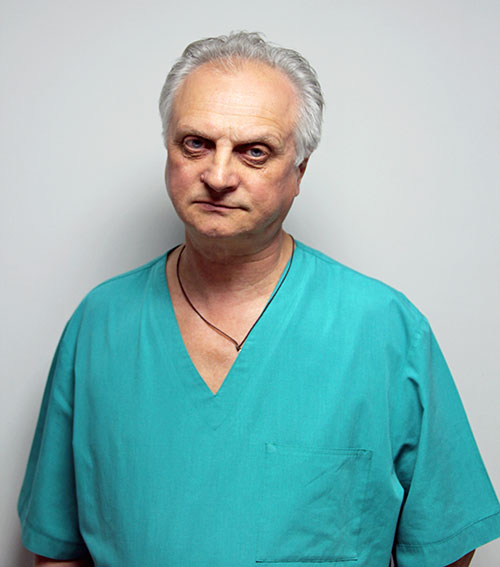
Moiseev Sergey Nikolaevich
traumatologist and orthopaedist
- Education: Medical school, graduated from the 2nd Moscow State Medical University NI Pirogov in 1981.
- Postgraduate studies in pediatrics, degree: Doctor.
- Certificate for the specialty 'Traumatology and Orthopaedics'.
- Certificate for the specialty 'Surgery (paediatrics)'.
- Qualification category: higher
- Candidate of Medical Sciences
Contact details
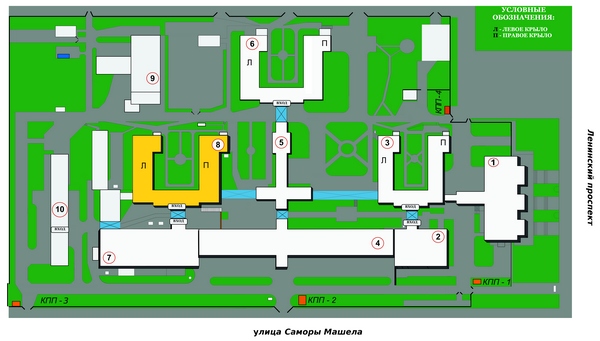
Department menu
- Department of Dermatovenereology
- Department of Reconstructive Plastic Surgery
- Department of Pediatric and Cardiovascular Surgery
- Department of Neurosurgery
- Department of Nephrology
- Department of Gastroenterology
- Department of Hematology and Chemotherapy, Ward 1
- Hematology and Chemotherapy Ward 2
- Department of Hematology and Chemotherapy Ward 3
- Infectious Diseases Department
- Department of Clinical Immunology and Rheumatology
- Department of Medical Genetics
- Department of Medical Rehabilitation of Patients with Central Nervous System Disorders
- Department of Surgical Kidney Transplantation
- Intensive care department
- Nephrology Intensive Care Unit
- Department of Diagnostic and Therapeutic X-ray Techniques
- Bone marrow transplant department
- Department of Oral and Maxillofacial Surgery
- Department of Ophthalmology
- Pediatric Department
- Psycho-neurological ward for older children
- Psycho-neurological ward for young children
- Gynecology station
- Oncology and Surgery Station
- Department of Surgery
- Department of Reconstructive Surgery and Reconstructive Abdominal Surgery
- Ear, Nose and Throat Department
- Department of Reconstructive and Thoracic Surgery
- Department of Traumatology and Orthopedics
- Department of Uroandrology
- Department of Endocrinology
If you have any questions or your right to free medical care has been violated, please contact
In matters related to free medical care and in cases of violation of citizens' rights to medical care, conflict resolution, including in cases of refusal or confiscation of money for medical care, please contact the
- to the administration of the medical institution – to the head of the department, the head of the medical institution;
- to the office of the insurance carrier, including the insurance agent – in person or by telephone, whose number is given in the insurance policy;
- Territorial Health Authority and Territorial Roszdravnadzor Authority, Territorial Compulsory Health Insurance Fund;
- Public councils (organizations) for protection of patients' rights operating at the Health Board of subjects of the Russian Federation and at the Roshdravnadzor Territorial Authority;
- Professional medical organizations and non-profit patient organizations;
- Federal authorities and organizations, including the Ministry of Health of the Russian Federation, the Federal Fund for Compulsory Medical Insurance, Roshdravnadzor, etc.
What you need to know about insurance agents from health insurance organizations
An insurance agent is an employee of a health insurance company who has completed special training, represents your interests and supports you individually in the provision of the statutory health services.
Insurance agent:
- He will provide you with information and advice, including the right to choose (change) and the procedure for choosing (change) a medical institution, a medical institution and a PhysicianThe insurance agent will also inform you about the procedure for taking out a compulsory health insurance policy;
- informs you of the need to undergo medical examinations and inquires about the results of these examinations
- advises on the provision of medical care;
- informs about the conditions of medical care and about the availability of places for planned hospitalization;
- Assistance in the choice of medical institution, including specialized medical care;
- supervising those who carry out health checks;
- Organizes the handling of insured persons' complaints about the quality and availability of medical care.
In addition, you can contact your insurance agent at the insurance company's facility if you
- Refusal of an appointment with a specialist if there is a referral from the treating doctor a referral from the attending physician;
- Exceeding waiting times for elective, emergency, and urgent medical care
- Denial of free medicines, medical devices, therapeutic nutrition - everything covered by the regulation;
- if you have to pay for medically necessary services prescribed by your doctor; or your doctor. If you have already paid for medical services, keep your receipts and receipts and contact your health insurance company, who will help you determine whether you have been billed for the amount owed and, if not, arrange for a refund;
- other cases where you feel your rights have been violated.
How do I get to the consultation?
Sample Referral for Hospitalization, Examination and Counseling:
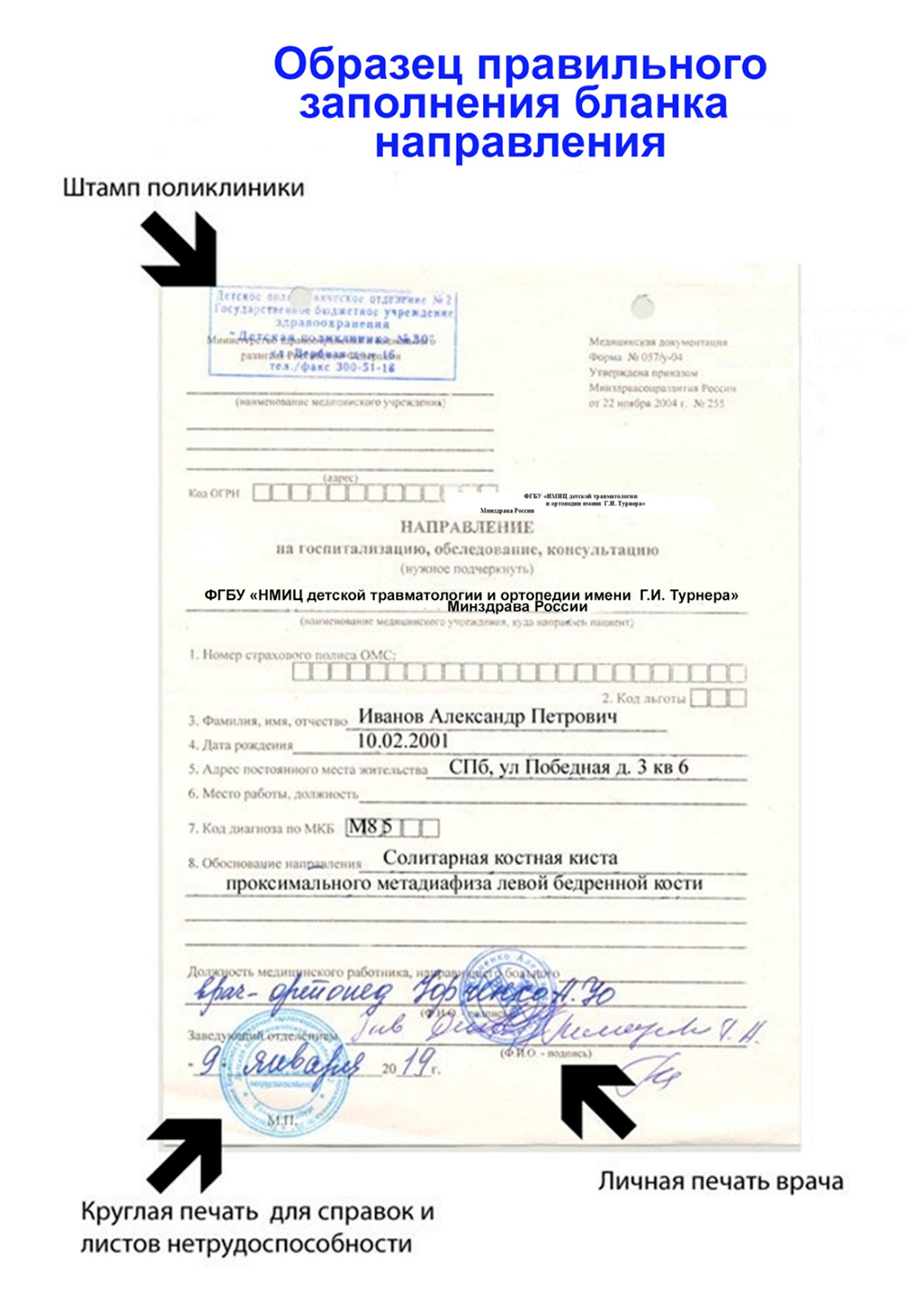
Sample of a referral for an MRI, X-ray or CT scan:
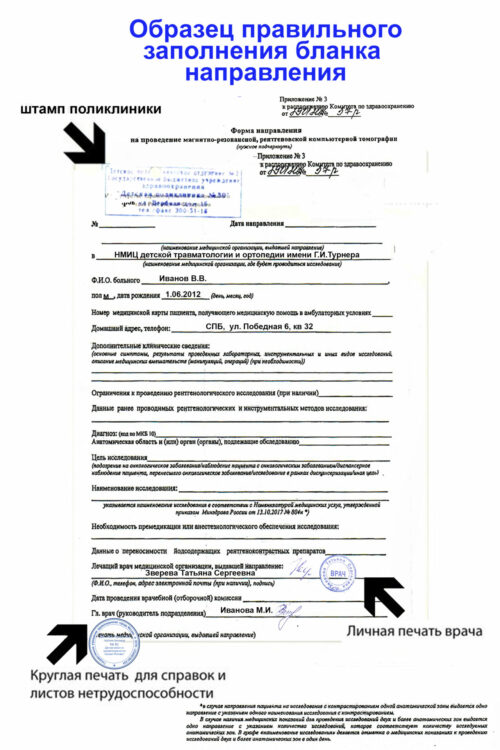
- Passport or birth certificate of the patient
- SNILS
- Disability card (if applicable)
- Passport of parents (or legal representative)
- Medical Documents
- Letter of intent to enter into a contract for paid medical services
- Voluntary and informed consent to receive and contract for paid medical services
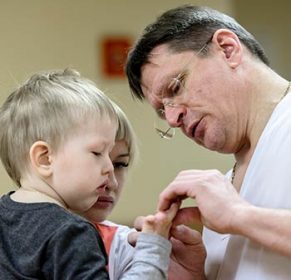
Patients with congenital and acquired diseases of the musculoskeletal system and the consequences of injuries are advised by the center's leading specialists, the candidates and doctors of medicine. They take in children and young people with congenital and acquired diseases and injuries to the musculoskeletal system.
As part of a consultative admission, a differential diagnosis of specific clinical cases is made, the indication for one or another treatment method and type of medical care is made, and a review of the results of previous treatment is carried out in the profile departments of the NIC Clinic.
During the visits, the patients are selected for inpatient treatment in the NICU clinics depending on the indication.
When should you see a doctor?
The orthopedic surgeon deals with a number of problems, as well as a variety of treatments and injuries to the skeletal system. Abnormalities in the bones, ligaments, joints, and spine that burden the patient can be caused by congenital injury, infection, or birth defects.
Disorders of the skeletal system develop gradually, which is why the first symptoms of the disease may not become apparent until the stage of severe changes. This is why regular visits to the doctor are so important from an early age.
There is a list of signs that may require a visit to the orthopedist and indicate the presence of problems in the musculoskeletal system:
- swelling of the joints, accompanied by painful movements;
- back pain;
- Poor posture and fatigue;
- nausea in the extremities;
- joint stiffness and crunches;
- Pain and stiffness with changing weather conditions.
The chronic disease leads to regular exacerbations that require regular visits to a specialist. Don't miss a doctor's visit if you've been diagnosed with the following conditions:
- dislocation of the shoulder or knee;
- osteochondrosis;
- injury to the spine;
- osteoarthritis;
- Rheumatoid arthritis;
- Fracture of the femoral neck.
As a preventive measure, a visit to the doctor is recommended for people leading an active lifestyle, for athletes and for people engaged in extreme sports and outdoor activities. A timely visit to the doctor's office makes it possible to diagnose and treat possible micro-injuries, thereby preventing the development of serious pathologies.
Both with acquired changes in the musculoskeletal system and with congenital anomalies, the child needs to see a specialist.
The child needs to see a doctor if:
- Infant's hip is misaligned (congenital dislocation);
- a diagnosis of torticollis (the child's head is tilted towards one shoulder);
- clubfoot (the child walks with the foot in a padded position);
- Stand;
- Complaints of pain in your shoulders, back and neck;
- flat feet.
How to make an appointment
There are a number of ways patients can schedule an appointment with an orthopedist.
One of them is the personal visit to the health center. They will help you to make an appointment with the specialist and will suggest the most convenient appointment for you.
Scheduling an appointment with an orthopedic surgeon is quick and easy through the treatment facility's website. After a short registration, the patient is shown a table with the available appointments. Once the right day has been selected, the patient only has to book the desired time and make an appointment with the orthopedist.
The contact persons can also be found easily on the clinic's website thanks to the convenient navigation. In this section you will find information about the availability of phone numbers and departments in your city. When the patient dials the number, they will be contacted by the medical center staff, who will politely answer any questions and offer an hour during which they can make an appointment with the orthopedist.
Another way to make an appointment with an orthopedist is to use the government service portal, where you have access to an electronic waiting list.
The main state hospitals
Municipal Clinical Hospital No. 1
City Clinical Hospital No. 1 in Pyrogov has always held a special place in Moscow's healthcare system. Moscow. It has accumulated a wealth of experience that has been passed down from generation to generation. In the scientific laboratories of the hospital, unique technologies are developed that are at the cutting edge of medical technology.

The trauma department of the hospital operates in two areas: emergency traumatology and orthopedics.
In interventional traumatology, osteosynthesis of fractures of the humerus, forearm, femur, tibia, ankle, pelvis, collarbone, shoulder, patella, heel and calcaneus and foot is performed using modern techniques and different types performed by metal fixators. For open fractures and extensive wounds, advanced treatment methods are used: vacuum drainage and the use of intramedullary struts with antibacterial coating.
Orthopedics deals with the primary and revision endoprosthetics of the hip and knee, the prosthetics of the humeral head and the radius bone. Minimally invasive high-tech foot operations are performed: treatment of all types of toe and forefoot deformities, surgical correction of hindfoot deformities, treatment of the consequences of defective heel bone fractures.
Clinical Research Center Moscow
The ICHC is a large, growing multidisciplinary facility of the Moscow City Health Department, a scientific and training center with professional staff.
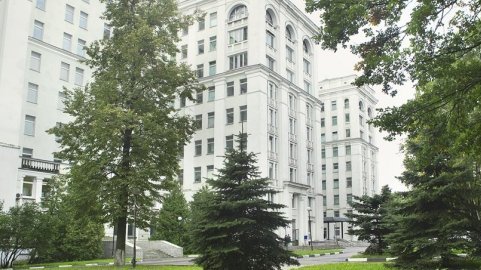
The hospital has an orthopedic department and a complex trauma department, which is appreciated by specialists and patients.
MEDICAL-SURGICAL CENTER MICPC
The structure of the Clinic for Sports Medicine 'MNPC MRSM' includes the following units: organizational and methodological department, outpatient clinic, 2 departments for rehabilitation treatments, clinical diagnostics and clinical and biochemical laboratories, departments for radiology, rehabilitation, surgery, physiotherapy, dentistry, therapy, functional diagnostics, Sports medicine, traumatology, sports injury center and sports pharmacy.
Top private clinics
EMC
The European Medical Center (EMC) is the number one private clinic offering technologically advanced treatment. She provides diagnosis and treatment in Moscow according to European and international protocols in accordance with the standards of international evidence-based medicine.
The European Clinic of Sports Traumatology and Orthopedics ECSTO (European Clinic of Sports Traumatology and Orthopedics) is one of the leading private clinics in Russia, the largest private orthopedic clinic in the Russian Federation, working on Western models and international standards in diagnosis, treatment and subsequent Rehabilitation of patients met. We have state-of-the-art medical equipment and the experience and expertise of the best European and Russian doctors. Medical care at the highest international level combined with the service of a 5-star hotel and a caring staff will make your stay in the clinic as pleasant as possible.
The European Clinic of Sports Traumatology and Orthopedics ECSTO (Moscow) is currently one of the few private clinics that has a number of high-tech equipment and a number of advantages that allow it to provide care to patients with diseases and injuries of any complexity.
Medical center MedSwiss
MedSwiss is a network of multidisciplinary medical centers in Moscow and St. Petersburg, which ranks among the ten largest private medical centers in the country. The main principle of MedSwiss is to ensure reliable, timely and highly professional medical assistance.
MedSwiss clinics are staffed by qualified orthopedists and traumatologists. A 24-hour trauma surgery service is also available for emergencies.
Survive the surgery
In most cases, the operation is performed on the day of admission: the person is hospitalized in the morning and operated a few hours later. The duration of a routine procedure depends on the disease in question. In the case of gallstones, for example, it is 40-60 minutes, and in the case of a severe hernia, several hours. After the operation, if everything goes according to plan, the patient returns to the ward.
Endoscopic surgery and modern recovery methods allow the body to experience minimal damage during the operation and to recover quickly afterwards. That's why you can be discharged the same day after a simple operation like removing a gallbladder or a lipoma - right after the anesthesia. In my experience, people who feel healthy are not kept in the hospital.
I've heard stories of patients being discharged from the hospital before they've had time to recover. In my experience, a doctor will not dismiss a person unless they think they are healthy. If this happens, you can complain to the Department of Health and the hospital will be held accountable for their negligence. Hospitals are now required to respond to all complaints and comments, including on social media.
However, I would like to remind you that the patient and the doctor are on the same page and that the apparent disconnect between client and provider only detracts from the treatment process. Medicine has not yet progressed to the point where a doctor can always guarantee a specific treatment result or the absence of complications.
If you feel uncomfortable or think that the doctor has done something wrong, it is better to first seek a face-to-face conversation with him and explain everything. You may not even need to file a complaint.
dismissal
Before you are discharged home, you will receive a discharge report, which is a copy of your medical history detailing everything that was done to you in the hospital. It will also include the doctor's recommendations. You will not be able to do any heavy work for a few weeks after the operation and you may need to follow a special diet. Even the simplest operation is still a great burden on the body, which is then weak for some time. If you ignore your doctor's advice, you risk being hospitalized again.
If you are officially employed, you will receive an electronic medical release 'for outpatient treatment'. You should then go to the surgeon who referred you for surgery or another surgeon on duty. The doctor will assess your condition and, if necessary, extend your sick leave: you have the right to remain at work until you recover.
Many hospitals use cosmetic stitches made from a special thread that dissolves on its own a few days after the operation. However, if these are ordinary seams, then you need to periodically connect them. You don't have to go to the hospital for this, you can do everything in your clinic.
- Make an appointment with the orthopedist.
- Moscow orthopedist.
- Visit to an orthopedist via the Internet.
- Kostin Arkadiusz Wiktorowicz traumatologist.
- Orthopedic surgeon in the ambulance.
- Orthopedic Center.
- Consultation of an orthopedic traumatologist.
- orthopedist.
